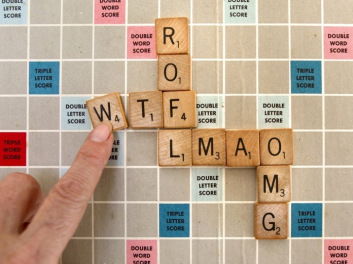Millennials are constantly reinventing the English language and continuously redefining ordinary and unordinary situations with slang. While some words are in style for only a short period of time, others transcend years of slang turnover. What makes some terms outlive their expiration dates? Perhaps it is how broad a word’s definition is; some slang terms can be used as nouns, verb, and adjectives. Or maybe it is how applicable they are to Instagram captions. Whatever the reason, millennial slang exemplifies how quickly trends catch fire. Interpersonal discourse, our main form of communication, redefines our culture every day, and millennials must stay up-to-date on the latest and greatest vocabulary. Here I will define some of the hottest slang of 2015.
To begin, I will identify some trending party and social-scene words. Have you ever heard “This place is lit!” and thought “Oh no! It’s on fire?” Well have no fear, because “lit” is used when there is a full house at a party or event and everyone is having a good time. “Lit” can be used interchangeably with “live.” Like “lit,” describing a place or event as “live” tells others that where they are is a lot of fun, as in, “Ram Town is live!” Consequently, this would make a lame event “dead.” However, “dead” is not exactly a “new” slang term, for it is common to say that when a place is empty it is “dead”. During Thanksgiving break, campus will be “dead.”
Before you head out to whatever fun activity you are participating in, it is time to “turn up” or as commonly simplified, “turn.” To “turn up” or be actively “turning up” is when you are getting pumped. “Turning up” gets you excited to go wherever or do whatever you have plans to do. Someone who has had too much fun or “turned” too hard, is classified as “turnt.” Being “turnt” is not necessarily good or bad, but simply a physical state. Those who aren’t too “turnt” and like to travel out and about in packs are rolling with their “squad.” When your whole group of friends struts into somewhere together, you are rolling in “squad deep.” Does this mean if you show up somewhere alone or with one another friend that you are rolling in “squad shallow?” To be determined. But what can be confirmed is that when your whole “squad” looks great, it is “on fleek.” “Fleek” is one of the most versatile slang terms because it can be used with both people and objects, typically addressing appearance. If you want to make someone’s day, you can say, “Your outfit is on fleek!” Being identified as “on fleek” will always be a welcomed compliment.
If your “squad” is not around, or social scenes are not your thing, you probably just want to “Netflix and chill.” “Netflix and chill” can be you-time when you do not feel like going out and just want to chill, or it can be a substitute for a date with that guy or girl you are “talking to” — another slang term for the in-between status of just friends and dating. Sometimes, “bae” just does not feel like doing anything except “Netflix and chill.” “Bae” exemplifies one of the millennial slang terms that successfully transitioned through consecutive years. “Bae” was introduced into millennial culture as an acronym for “before anything else.” Now, “bae” affectionately addresses everything from that special someone in your life to your dog to a fresh slice of pizza. If you are searching for an Instagram caption for your photo of you with your favorite ice cream piled high onto a cone, there is a good chance your caption will end up being something like: “Me and Bae.” A caption like this will result in you being classified as “basic,” which leads to the question: what exactly constitutes being “basic?” Another slang term that has stuck around, “basic” people or situations frequently come up in conversation. The fall season in particular is notorious for inducing “basic” behavior. For example, if your friend leaves her apartment dressed for “sweater weather” in fashionable fall attire to get pumpkin spiced lattes from Starbucks before going apple-picking, she is undeniably guilty of being ”basic.” Being “basic” is not just a certain way you look, but also a way you feel and speak.
When you are listening to a ridiculous story about your “bff’s” encounter with her ex-boyfriend, and you respond, “I can’t even,” your response is not only “basic,” but also an utterance of another long-lasting millennial slang term. Sometimes, a situation is so much to handle that you just “can’t even.” People use “can’t even” as a reply when they cannot quite put into words how they feel. “Can’t even” expresses everything by expressing nothing. A similar response of nothingness is “word.” “Word” can be an affirmation used synonymously with “sure” or “ok.” “Word” also functions as a filler when you do not know what else to say. There is no better way to keep a conversation short and sweet than by responding with “word.”
In retrospect, millennial slang terms are both comical and intriguing. If you find yourself responding “word” to your “bae” after he tells you your outfit is “on fleek” and asks if you want to “Netflix and chill,” do not fear of appearing “basic.” Instead, embrace the language that is unique to millennials.





